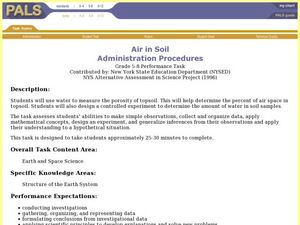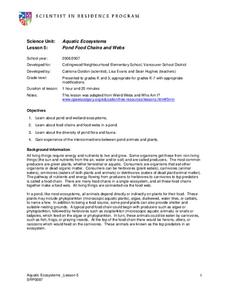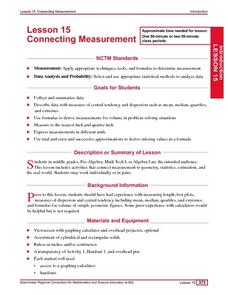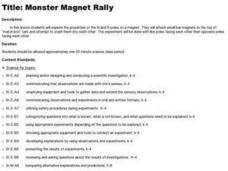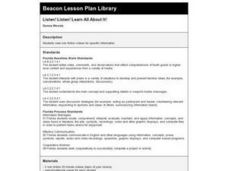Curated OER
Sheep Brain Dissection
Students study the brain and examine what the functions of the major functions are. In this investigative lesson students dissect a sheep's brain and note the similarities and differences between it and a humans brain.
Curated OER
Air in Soil Administration Procedures
Students study soil and its composition. In this soil composition lesson, students study examples of soil during several days of aeration. Students summarize their data, organize it, and must be able to explain their findings.
Curated OER
Light & Colors
Students identify the types of light on the visible spectrum. They identify relationships between angles and mirrors. They state how they use light in their everyday lives.
Curated OER
Measurement of the Depth of the Ocean
Students comprehend the physical properties of pressure and Boyle's Law by designing a depth gauge. They construct a capillary depth gauge and calculate the calibrated depth marks of the capillary tube. They determine the margin of error...
Curated OER
DOES A FLUCTUATION IN TEMPERATURE IFFECT THE GROWTH AND SURVIVAL RATE OF AQUATIC PLANTS?
High schoolers determine if different temperatures effect the growth and survival rates of aquatic plants and evaluate the optimal temperature for the growth of aquatic plants.
Curated OER
Acid and Bases - Alien II
Eighth graders determine which of two solutions is more acidic by adding each to a given base. Students have to apply this analysis process to a problem scenario involving an alien creature.
Curated OER
Electrical Circuits And Switches
Students design and draw circuits with batteries, small light bulbs and common household conductors. They build and test the circuit then modify it so someone who couldn't use their hands could turn the circuit on and off.
Curated OER
Aquatic Ecosystems
Students study ponds and wetland ecosystems and examine the food chains and webs in them. In this aquatic ecosystems lesson students answer questions about the diversity of the flora and fauna in a pond.
Curated OER
Organic Materials in an Aquatic Ecosystem
Students evaluate the relationship between oxygen levels and the amount of organic matter in an aquatic ecosystem. They explain the relationship between oxygen levels, bacteria and the breakdown of organic matter using an indicator...
Curated OER
Connecting Measurement
Students participate in activities the connect measurement to geometry, statistics, estimation, and the real world. They collect measurements from their elbow to the tip of their middle finger and make a box plot of the data as well as...
Curated OER
I Can See and Feel the Change in the Seasons
Pupils use their senses to investigate the changes in the seasons. They discuss how the Earth moves around the sun and its tilt. They practice using new vocabulary and examining the different seasons.
Curated OER
Monster Magnet Rally
Students explore the properties of the N and S poles on a magnet. They attach small bar magnets to the top of "match box" cars and attempt to crash them into each other. They each write a summary describing their findings.
Curated OER
Chemical Reaction of Carbonate Rocks and Acids
Students complete an investigation into the chemical reaction that occurs between carbonate rocks and acids. Working in groups, students design and conduct their investigation. They create a data table detailing their results. Results...
Curated OER
Wacky Water Critters
Students recognize the biodiversity that exists in a wetland ecosystem. They identify individual wetland organisms. Students define, identify, and comprehend the importance of adaptations. They describe the process of metamorphosis.
Curated OER
Problem-Based Research Lesson: Wilderness Issues
Students read and discuss articles relating to the theme "How should we deal with the growth of towns and human populations into wilderness areas?" Based on the class brainstorm, each student generates a research topic. They are grouped...
Curated OER
Is It Alive?
Eighth graders define the boundaries of living organisms. They determine what makes something a living organism and identify factors that constitute "living." Pupils write a conclusion about the evidence they found that yeast is alive...
Curated OER
How the Amount of Solar Energy Absorbed by the Earth is Dependent Upon the Earth's Position
Students investigate the angle of light and how it faces the earth. They conduct a series of investigations with the following two objectives. Students determine if the angle of light is a factor in the absorption of heat. They correlate...
Curated OER
Listen! Listen! Learn All About It!
Fourth graders view non-fiction videos. They write questions that can be answered with information in the video. Every 10 minutes the video is stopped and the class discusses the questions.
Curated OER
Making Tracks
Fifth graders examine the fossil footprints of two and four legged dinosaurs. Using this information, they try to determine how the dinosaurs lived their lives. They use their own walking pattern to compare it to the dinosaurs and...
Curated OER
Maya Mystery
Students use the Internet and e-mail to research the Mayan culture. They participate in "Mayaquest" and create a multimedia presentation and a visual product of what they find in their research.
Curated OER
Decomposing Artifacts
Seventh graders participate in an experiment in which they calculate the time of decomposition of different materials. In groups, they fill bags with different materials and cover them in soil. After six months, they create a line graph...
Curated OER
Nuclear Transplants
Learners model the removal of a cell nucleus and the insertion of an alternate control center. They define some of the challenges faced in this type of transplant procedure. Students discuss cloning.
Curated OER
Balancing Bottles
Students explore the Law of Conservation of Matter using effervescent tablets. In this mass and energy lesson, students investigate how mass is conserved in the reaction of effervescent tablets and water. They will discuss and...
Curated OER
A Guided Journey Into the Past
Fourth graders use guided imagery to discover and judge an alternative way to enjoy artifacts without removing them from archaeological sites.



